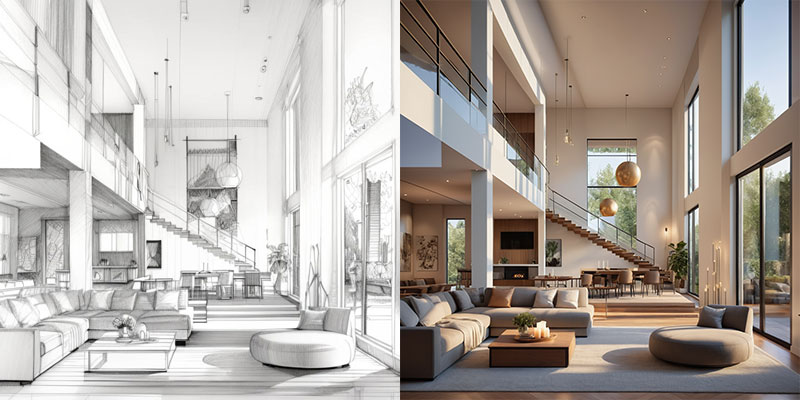친구를 초대하고 둘 다 무료 코인을 받으세요

a room with a large window, lanterns, and several candles
yvonne liao
스케치 렌더링
v3
This photo shows a typical Japanese traditional room, designed in a Zen-like and natural beauty that creates a sense of deep tranquility and comfort. Here is a detailed description of the photo style:
The room uses wood as the main building material, and the dark wooden floor and ceiling echo each other, showing a low-key and calm aesthetic. Classic Japanese lattice sliding doors (shoji doors) are used on the walls, doors and windows. The Japanese paper on the shoji softens the light, making the light inside the room appear soft and even.
The central part is a traditional tatami area, laid with fine straw woven mats, creating a space for rest and meditation. A low wooden coffee table is placed next to the tatami. Simple tea sets and vases are placed on the coffee table, creating a quiet and leisurely atmosphere.
The front of the room is surrounded by large open wooden doors and windows, framing a charming natural landscape of rolling hills and mist-shrouded forests. This design not only integrates the outdoor natural scenery into the interior, but also perfectly integrates the room with the surrounding natural environment, reflecting the emphasis that Japanese design places on "integration of inside and outside".
The lighting design is low-key and warm, and the hidden lights behind the shoji screen provide a soft background light source, emphasizing the layering of the space. Paper lanterns on the floor emit warm orange light, adding to the intimacy and Zen feel of the room.
The overall tone is dominated by black wood and natural colors. The dark brown tones of the walls, floors and furniture contrast with the beige of the tatami, presenting a harmonious visual effect. In terms of texture, the texture of wood and the delicate touch of straw make people feel rustic and natural.
The design incorporates traditional Japanese aesthetics, including simple lines, the use of natural materials, and an emphasis on light and shadow effects, which fully embodies the "Wabi-sabi" and "Zen" in Japanese culture.
Overall, the style of this space is low-key and elegant, conveying a deep sense of tranquility. It is a retreat that is integrated with nature, allowing people to relax and stay away from the hustle and bustle.
스타일:
사진-건축 렌더링
장면:
침실,침대,벽 장식,협탁,일본의 자연스러운 편안함
모드:
정밀 개념
창의성:
56
0
리믹스
0
좋아요아직 댓글이 없습니다
더 비슷한 내용
a room with a large window, lanterns, and several candles
yvonne liao
스케치 렌더링
v3
This photo shows a typical Japanese traditional room, designed in a Zen-like and natural beauty that creates a sense of deep tranquility and comfort. Here is a detailed description of the photo style:
The room uses wood as the main building material, and the dark wooden floor and ceiling echo each other, showing a low-key and calm aesthetic. Classic Japanese lattice sliding doors (shoji doors) are used on the walls, doors and windows. The Japanese paper on the shoji softens the light, making the light inside the room appear soft and even.
The central part is a traditional tatami area, laid with fine straw woven mats, creating a space for rest and meditation. A low wooden coffee table is placed next to the tatami. Simple tea sets and vases are placed on the coffee table, creating a quiet and leisurely atmosphere.
The front of the room is surrounded by large open wooden doors and windows, framing a charming natural landscape of rolling hills and mist-shrouded forests. This design not only integrates the outdoor natural scenery into the interior, but also perfectly integrates the room with the surrounding natural environment, reflecting the emphasis that Japanese design places on "integration of inside and outside".
The lighting design is low-key and warm, and the hidden lights behind the shoji screen provide a soft background light source, emphasizing the layering of the space. Paper lanterns on the floor emit warm orange light, adding to the intimacy and Zen feel of the room.
The overall tone is dominated by black wood and natural colors. The dark brown tones of the walls, floors and furniture contrast with the beige of the tatami, presenting a harmonious visual effect. In terms of texture, the texture of wood and the delicate touch of straw make people feel rustic and natural.
The design incorporates traditional Japanese aesthetics, including simple lines, the use of natural materials, and an emphasis on light and shadow effects, which fully embodies the "Wabi-sabi" and "Zen" in Japanese culture.
Overall, the style of this space is low-key and elegant, conveying a deep sense of tranquility. It is a retreat that is integrated with nature, allowing people to relax and stay away from the hustle and bustle.
스타일:
사진-건축 렌더링
장면:
침실,침대,벽 장식,협탁,일본의 자연스러운 편안함
모드:
정밀 개념
창의성:
56
0
리믹스
0
좋아요아직 댓글이 없습니다



























